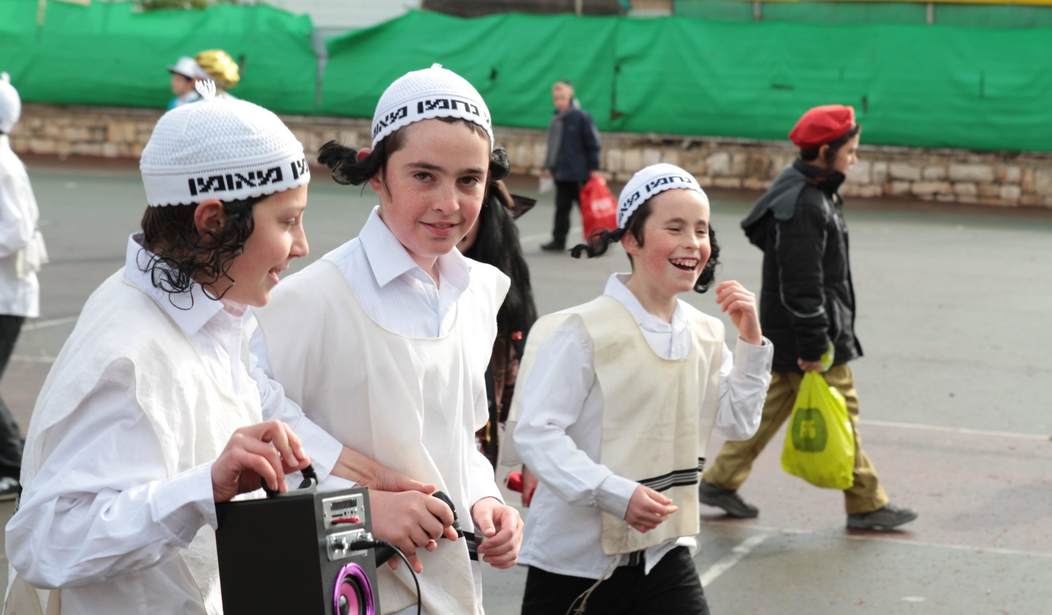The next time your child complains about his or her long days at school and hours of homework, tell him or her about the students at the Wisconsin Institute of Torah Study (WITS) in Milwaukee, Wisconsin, an Orthodox all-male high school where the day begins at seven-thirty in the morning with prayers before the students can even eat breakfast.
It’s not a long, leisurely breakfast, either, as the school day gets quickly underway. The reason for the long days is that these students have both the regular English curriculum and a curriculum of Torah and religious studies. They also have two other prayer sessions during the day, in the afternoon and at night. The students’ school day finally ends at 8:45 in the evening. There’s also a half-day session on Sundays. Other boys’ high schools even go until ten p.m.
A dress code is generally enforced at all Orthodox young men’s schools: no sneakers, tee shirts, or jeans — only slacks, dress shoes, and button-down shirts. Of course, piercings and tattoos are not allowed, as the Jewish religion prohibits defacing of the body. Some of the Jewish schools mandate uniforms for their students, but not all.
The hours at the girls’ high schools are shorter — until about five — and their days also start with prayer sessions. They also have dress codes and must wear modest long-sleeved dresses or skirts and blouses. No jeans, or tennis shoes, or sandals are allowed. This dress code often starts as early as kindergarten in many schools.
Cell phones are verboten.
There are also some Orthodox Jewish co-ed high schools and they also have long hours, longer than those of the public schools. Even in many of the co-ed Orthodox schools, boys and girls are taught separately from kindergarten on.
But these kids have been doing these long school days for years, since they were very little. This long-day education starts very early with the Orthodox schools. My grandson Yehudah is seven and attends an Orthodox school (Toras Emes in Los Angeles, Calif.). He already has long days, a half day on Sunday, and homework as well. Boys in the upper elementary grades of these Orthodox schools generally have hours until 5:30, upper grade girls until 4:30.
They also become bilingual from first grade on, learning how to read both Hebrew and English. However, the kids don’t complain about the long days as all of their friends have the same long days. Since they’ve been having these long hours since they were in primary school, they don’t even realize that other children don’t go to school for long hours as well. For them, long school days are the norm. All their friends also have these hours.
From early on, they are taught that there is a certain conduct expected of them. Rewards are given for knowing their prayers, for behaving respectfully, for doing good deeds such as being nice to each other, and later, when they are in their pre-teen or teenage years, they are commended for doing things like visiting the sick in hospitals or nursing homes. Organized visits to places like these are done through the schools.
Respect for their elders and especially for learned men is ingrained in these children. They will stand in honor of their learned rabbis when the rabbis enter a room. Adults are called by their title or Mr. and Mrs., rarely ever by their first names.
These long hours certainly don’t leave the children with time on their hands for getting into mischief. This experience also prepares many for the arduous hours of professional schools like those for law or medicine.
College is a slam dunk for many of the graduates of the Orthodox educational system. They’re used to spending hours in study, so they are well prepared for a college curriculum.
In the male-only high schools you may hear loud discussions and even arguments, but they are arguments about religious topics and interpretations of a particular passage that a couple of the boys are studying together. These schools have one-on-one sessions where two male students study the Talmud and its commentaries. You will not find in these schools any violence, drugs, or any other type of contraband that you find in some public schools. There are no signs that say “no guns allowed,” as the entire concept of having guns is foreign to these kids.
Penalties or detention are given — for example, at WITS — for misdemeanors like not going to bed on time, talking during prayers or classes, playing the wrong kind of music at school or in the dorms, or for cell phone use in public. Books are vetted, as are other reading materials.
In Israel, the school hours are even longer. Eleven- and twelve-year-old boys go to school from 8:30 a.m. to 7:45 p.m. The younger children go until 5:45 p.m. Again, here, as in the United States, the girls’ school hours are generally shorter.
Times vary from school to school in the U.S. and in Israel, but the hours are always longer than in the public schools in the U.S.; the long hours of learning, and the dress and conduct codes, help evolve the students of these Orthodox schools into upstanding citizens.









Join the conversation as a VIP Member